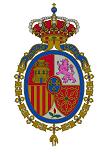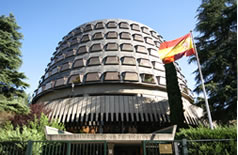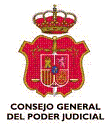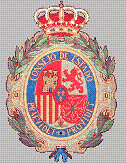Royal House
 The King is the Head of State, a symbol of its unity and stability, who arbitrates on and moderates the ordinary functioning of the institutions, assumes the highest level of representation of the Spanish state in international relations, especially with the nations of its historical community, and performs the functions that are expressly attributed to him by the Constitution and the Law. Web site
The King is the Head of State, a symbol of its unity and stability, who arbitrates on and moderates the ordinary functioning of the institutions, assumes the highest level of representation of the Spanish state in international relations, especially with the nations of its historical community, and performs the functions that are expressly attributed to him by the Constitution and the Law. Web site
Lower House of Parliament (Congreso)

The Cortes Generales (Parliament) represents the Spanish people and is made up of the Lower House [Congreso] and the Upper House [Senado]; it exercises the legislative power of the State, approves its budgets and controls the actions of the Government. The Lower House is composed of a minimum of 300 and a maximum of 400 members of Parliament elected by universal, free, equal, direct and secret suffrage. Web site
Upper House of Parliament (Senado)
 The Upper House is the Chamber of territorial representation. It has two types of members with the same rights and prerogatives: 208 Senators who are directly elected by the citizens using a majority system and around 50 nominated by the Autonomous Regions. In a similar way to the Lower House, it performs the functions that the Constitution attributes to the Cortes Generales. Web site
The Upper House is the Chamber of territorial representation. It has two types of members with the same rights and prerogatives: 208 Senators who are directly elected by the citizens using a majority system and around 50 nominated by the Autonomous Regions. In a similar way to the Lower House, it performs the functions that the Constitution attributes to the Cortes Generales. Web site
Constitutional Court

The Constitutional Court is the supreme interpreter of the Constitution, unique in its rank and with jurisdiction throughout the country. It is independent from the other constitutional bodies and is only subject to the Constitution and to Constitutional Law. Web site
Ombudsman
 The mission of the Ombudsman is to protect and defend the fundamental rights and public liberties of the citizens. The Ombudsman is chosen by the Lower House and the Upper House by means of a vote, in which a three-fifths majority is required, for a period of five years. The Ombudsman is not subject to any government order, he does not receive instructions from any authority, he performs his functions with autonomy and he enjoys inviolability and immunity whilst he holds the post. Web site
The mission of the Ombudsman is to protect and defend the fundamental rights and public liberties of the citizens. The Ombudsman is chosen by the Lower House and the Upper House by means of a vote, in which a three-fifths majority is required, for a period of five years. The Ombudsman is not subject to any government order, he does not receive instructions from any authority, he performs his functions with autonomy and he enjoys inviolability and immunity whilst he holds the post. Web site
General Council of the Judiciary

This is the governing body of the Judiciary, with competence throughout national territory. Its main task is to ensure the independence of Judges and Magistrates in the exercising of the jurisdictional functions that are particular to them. Web site
State Council
 The State Council is one of the oldest institutions in Spain. The main function of the State Council is that of issuing opinions at the request of the consulting authority. The opinion is a document in which the State Council expresses its criterion about the issues that it has been consulted on. The consultations are mandatory or optional. Web site
The State Council is one of the oldest institutions in Spain. The main function of the State Council is that of issuing opinions at the request of the consulting authority. The opinion is a document in which the State Council expresses its criterion about the issues that it has been consulted on. The consultations are mandatory or optional. Web site
Economic and Social Council

The Economic and Social Council is a consultative body of the Government on socio-economic and employment matters. It is configured as a public law entity, with its own legal personality, full capacity and statutory and functional autonomy for compliance with its purposes, forming part of the Ministry of Work and Immigration. Web site
Committee on Public Accounts
 The Spanish Magna Carta and the Constitutional and Functioning Laws define the Committee on Public Accounts as the supreme supervisory body of the accounts and the economic management of the State, as well as the Public Sector, regardless of its own jurisdiction and excluding the supervisory powers of the External Control Bodies of the Autonomous Regions. It is placed in the sphere of Legislative Power, reporting directly to the Cortes Generales - even though it is not a body that is particular to the National Parliament. Its twelve members - the Accounts Directors, six appointed by the Upper House and six by the Lower House - have the same independence, tenure and incompatibilities as judges, and the two functions that are entrusted to them - which are their traditional ones - the supervisory and the jurisdictional, are separated with complete clarity. Web site
The Spanish Magna Carta and the Constitutional and Functioning Laws define the Committee on Public Accounts as the supreme supervisory body of the accounts and the economic management of the State, as well as the Public Sector, regardless of its own jurisdiction and excluding the supervisory powers of the External Control Bodies of the Autonomous Regions. It is placed in the sphere of Legislative Power, reporting directly to the Cortes Generales - even though it is not a body that is particular to the National Parliament. Its twelve members - the Accounts Directors, six appointed by the Upper House and six by the Lower House - have the same independence, tenure and incompatibilities as judges, and the two functions that are entrusted to them - which are their traditional ones - the supervisory and the jurisdictional, are separated with complete clarity. Web site




